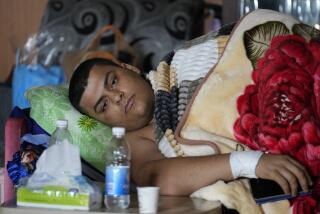Assassinations, Deadly Blasts in Iraq
- Share via
BAGHDAD — Blood continued to flow in cities across Iraq on Thursday as three car bombs killed at least 14 Iraqis here and in Kirkuk, three American soldiers were slain by explosives, and three high-ranking Iraqi security officials were assassinated on their way to work.
The deadliest incident took place outside a crowded Baghdad marketplace, where a suicide car bomber detonated his explosives near families shopping or enjoying a late breakfast in popular restaurants lining the street. Twelve people were killed and more than 50 were wounded in the Jadida neighborhood attack.
In Kirkuk, about 150 miles north of the capital, two car bombs exploded, one killing two people at a police station, Associated Press reported. Police said two people were wounded when a bomb apparently targeting an American patrol went off near an Iraqi army checkpoint.
Police declared a state of emergency in Al Tamim province, of which Kirkuk is the capital, announcing a curfew from 11 p.m. to 6 a.m.
In the last two weeks, more than 400 Iraqis have been killed in insurgent attacks, the vast majority of them civilians going about their daily business. On Wednesday alone, at least 60 people were killed in bombings.
Insurgents also continued to target U.S. troops.
Two U.S. soldiers were injured Thursday on patrol in Samarra, a volatile Sunni Muslim city 60 miles northwest of Baghdad, when their vehicle struck explosives. Both were evacuated to a medical facility, where one died of his wounds, the U.S. military said.
Near Musayyib, south of the capital, a U.S. soldier was killed when his vehicle struck a bomb. Another soldier died after his vehicle was hit by a roadside bomb in eastern Baghdad.
On Wednesday, five Marines participating in an offensive against insurgent strongholds near the border with Syria were killed when their amphibious vehicle struck a roadside bomb, Marine officials in western Iraq said.
Since the operation began Sunday, eight Marines have been killed and 37 wounded.
“I’ve seen gangsters with gunshots and everything,” said Lance Cpl. Ruben Cervantez of Fresno, a corpsman who was riding in the vehicle a few minutes before it struck the bomb. “Back home I work on them, and then it’s like, whatever. Here, all these people are my friends. It’s a different story.”
Here and elsewhere, American troops have sought to prevent roadside bombs by a variety of means, including jamming devices, but they have been largely unsuccessful.
In Baghdad, three Iraqi security officials en route to work were shot to death in quick succession Thursday morning, police and government officials said.
At 7:15 a.m., drive-by gunmen opened fire on Brig. Gen. Ayad Emad Mehdi, a Defense Ministry employee. He died of his injuries on the way to a hospital.
Fifteen minutes later, Col. Mohammed Taie was shot to death. And at 7:45 a.m., bullets struck Col. Jamal Ahmed, an Interior Ministry official, who died at a hospital.
In western Iraq’s restive Al Anbar province, the incoming governor remained missing two days after he was kidnapped by rebels claiming affiliation with militant leader Abu Musab Zarqawi.
The previous governor resigned after his three sons were abducted and he was forced to make a videotape apologizing for working with U.S. forces.
The Al Anbar region is dominated by Sunnis, who are believed to be fueling the insurgency. Favored under former dictator Saddam Hussein, they lost substantial power when he was ousted.
Sunnis boycotted the Jan. 30 election and are sparsely represented in the Shiite Muslim-dominated government that was named April 28.
Since then, guerrillas have escalated their attacks to about 75 daily, double the number of six weeks ago, according to the U.S. military. Suicide car bombings are an everyday occurrence in the capital, with civilians and security officers bearing the brunt of the violence.
The explosion Thursday at the market in a largely Shiite neighborhood of eastern Baghdad reminded Iraqis that even shopping for groceries is now a perilous task.
Roads were jammed with cars and streets crowded with pedestrians shortly before 11 a.m. when the bomb went off, blasting through storefronts and upending vehicles near a movie theater and a mosque.
Abdul Rehman Rasheed, 41, and his wife were visiting relatives in town. Driving “with my wife sitting beside me,” Rasheed said, “I was about to suggest to her that we have a fruit juice ... before we go to see our relatives.
“We heard a blast and felt as if a building had collapsed upon us. Within seconds everything was black. Just black smoke and dust. My wife was screaming, and we left the car, going nowhere among screams, shouts and flames, [which were] just starting to grow bigger.”
As they fled, Rasheed said, he saw a man escaping a minibus on fire. “He was all burning,” Rasheed said.
In the turmoil, an Iraqi national guardsman accidentally discharged his Kalashnikov rifle. A man in a white dishdasha robe collapsed, screaming. The injured man, Awad Mahmoud, 49, had come to claim a car belonging to his brother, who had been taken to a hospital.
“He suffers from serious burns,” Mahmoud said. “I came to take his car back home, but I couldn’t find it.”
Now he too was hurt. The bullet had struck his toe.
*
Times staff writers Suhail Ahmad, Raheem Salman, Saif Rasheed and Zainab Hussein in Baghdad, Solomon Moore traveling with the U.S. Marines in western Iraq, and Tony Perry in San Diego contributed to this report.
More to Read
Sign up for Essential California
The most important California stories and recommendations in your inbox every morning.
You may occasionally receive promotional content from the Los Angeles Times.













